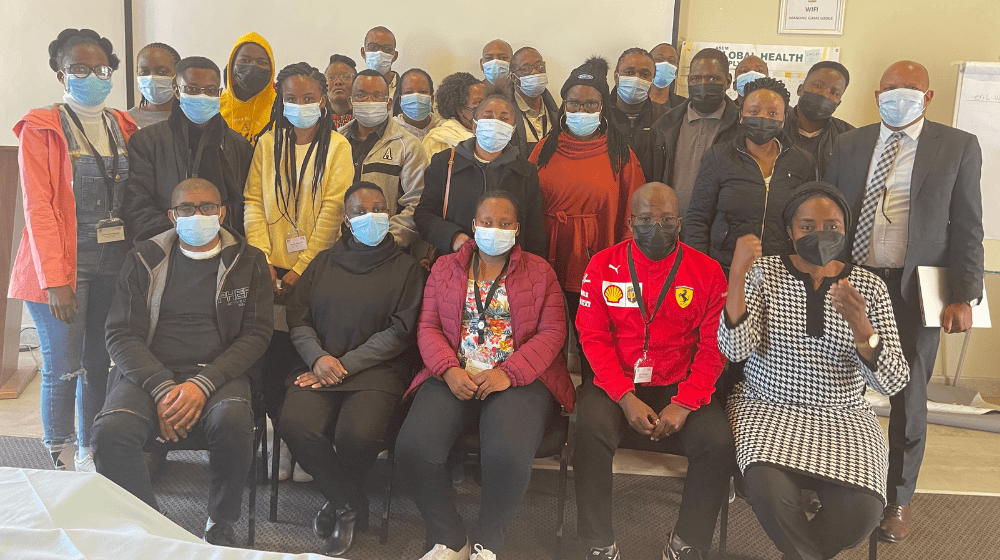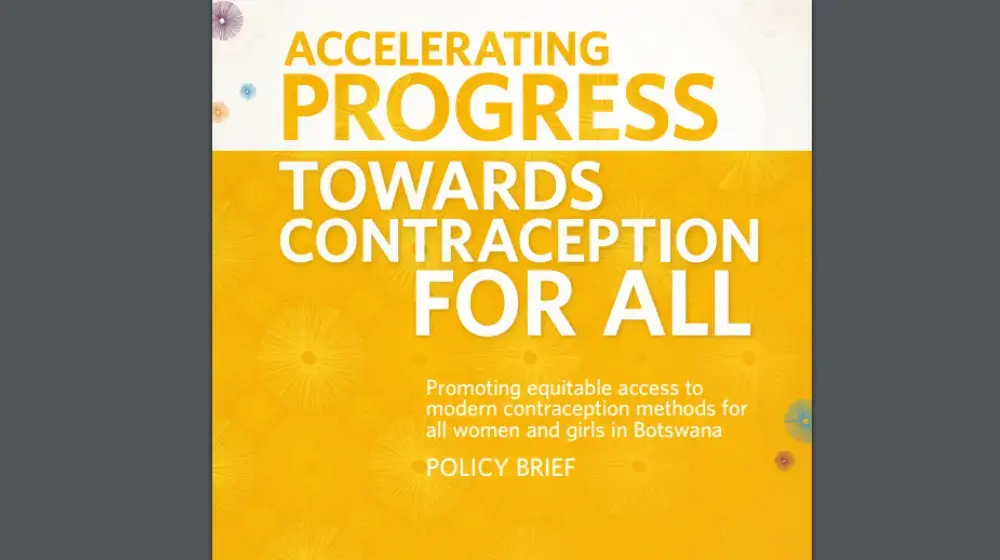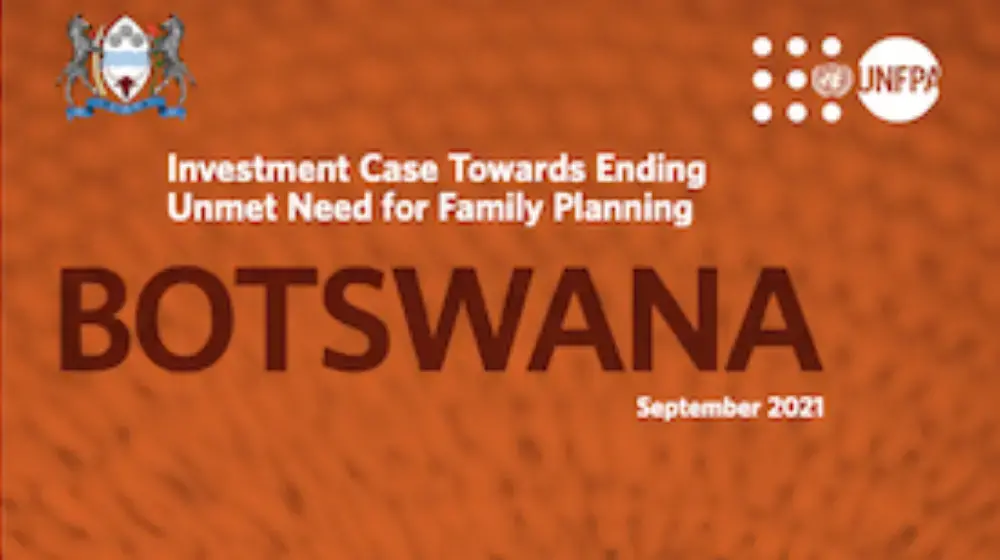Gaborone, BOTSWANA- UNFPA Botswana and its regional office of East and Southern Africa is on a path to optimize the performance of the Botswana supply chain to ensure timely delivery of medicines and health products, particularly family planning commodities.
UNFPA is leading the global effort to ensure all individuals can access and use affordable, quality reproductive health supplies whenever they need them. This will mean fewer unintended pregnancies, fewer abortions, less maternal mortality, healthier families and healthier economies.
Botswana has been experiencing some challenges around access and use of modern contraceptives recently. This is due to a number of factors that include a weak supply chain system; poor quantification of commodities; no last mile tracking capability, limited use of electronic Logistics Management Information System (LMIS) and limited innovative and sustained demand creation.
Stock-outs and over-stocks
Stock-outs of essential reproductive health supplies represent a breakdown in the procurement and supply chain end-to-end continuum. Botswana has recently experienced acute stock outs of reproductive health commodities particularly male condoms, contraceptive pills and Depo Medroxyprogesterone Injection. Female condoms are often adequately stocked due to lack of demand creation coupled with negative attitudes among both the service providers and target market. Adolescents often face barriers in accessing information on contraceptives and their preferred methods, including emergency contraceptives.
The COVID-19 pandemic has further disrupted international, regional and local supply chains, undermining national response efforts and putting a strain on other critical and routine health interventions.
For women and girls, the impact of stock outs of essential reproductive health supplies can be life-threatening as it may lead to unintended and unwanted pregnancies, which may in turn result in unsafe abortions. Shortage of male condoms, which are the preferred method of choice for spacing and limiting the number of children in Botswana, and plays a critical role in preventing HIV and other STIs, meant that women and girls were at a higher risk of contracting HIV and other sexually transmitted infections and unitended pregnacies.
Support to addressing the challenges
To address these challenges, UNFPA provided technical assistance through a 5 day training of over 30 health workers from 17 health districts on supply chain management systems as well as representatives from Central Medical Stores (CMS) and Ministry of Health. The training assessed the maturity of the Botswana Supply Chain Management, and identified recommendations to address the challenges faced. This is considered a critical phase to strengthen the national supply chain system.
Besides the assessment, other key areas covered during the training included topics such as FP2030 commitments and UNFPA Suppliers Partnerships, which introduced participants to the UNFPA cost - effective platforms to procure commodities.
Although the training was focused on reproductive health, it has an impact on national supply chain systems in general as this support helps countries to better understand and visualize their particular bottlenecks and ways of addressing them; to operationalize LMIS; and improve national capacity to manage national health supply chains.
Speaking on the importance of this training, the UNFPA Regional Family Planning Policy Adviser, Ms. Ramatu Daroda highlighted the progress made by the country in regard to family planning, which has seen an increase in Contraceptive Prevalence Rate from 53% in 2007 to 64.7% in 2017. She however indicated that there are still challenges within the supply chain management system, which leads to stock-outs, over stocking and sometimes expiries, hence the need for training to close these gaps.
Ms. Mabel Mbewe from Central Medical Stores (CMS) echoed the same sentiments on the challenges that they have been facing. She underscored that there have been challenges with data visibility throughout the supply chain system due to limited reporting through LMIS and use of multiple reporting platforms, as well as most service facilities’ data not reaching CMS.
Ms. Sifelani Malima from the SRH Division at the Ministry of Health noted that some of the challenges are human resource related as it has been revealed that there is a dire shortage of competent staff trained to administer some family planning commodities such as intrauterine devices (IUDs) and the contraceptive implants. She acknowledged that more trainings needs to be conducted for health care providers to close this gap and expand access to a wide range of contraceptive methods.
Participants representing facilities of service delivery such as Mr. Phenyo Molelwana from Shakawe and Ms. Bawilili Motimedi from Selebi Phikwe cited other challenges such as low uptake of female condoms in their respective areas. They attributed this to myths and misinformation surrounding the female condoms.
The Supply Chain Maturity Model
The training provided a platform for the participants to assess Botswana’s Supply Chain Maturity. The Supply Chain Maturity Model tool enables health officials to review the performance of 20 critical operational and technical supply chain functions. The assessment revealed that the maturity of the supply chain is currently at 48.8%. The participants agreed on a goal to increase this to 65% by November 2022.
Some of the key areas in the maturity model that scored very low and where the country needs to focus to strengthen the SCM include Supply Planning/management, Fund Management, Financial Management and Governance which all scored 20%. The highest score, at 100% was under Expiry Management.
Supply Chain Maturity Model is a participatory, qualitative supply chain assessment is a tool that helps to determine whether supply chain management is a barrier to access. This exercise provides decision-makers with a formal baseline for each supply chain area, links targeted priority investments against evidence of need, outlines technical assistance needs from partners, and leads to the development of national supply chain strengthening response plans that expand access to essential medicines and health products for all. Concurrently, the interventions also highlight the strengths of supply chain modeling with a clear opportunity to share best practices and promote cross-learning opportunities.
Mr. Oaitse Bolokanang from Chemonics Botswana appreciated the introduction of the maturity model and the assessment done for Botswana emphasizing that it has helped map the performance of the supply chain in the country, which provides a baseline to work with and improve on.
“We scored 48.8% and this has been a collective effort from all stakeholders in the supply chain management system. I encourage CMS to work collectively with the SRH division in the ministry to ensure that we provide a holistic system that will be accessed by all stakeholders for better data flow,” he noted.
Path forward to counter these challenges?
The participants identified key actions to prioritize in order to ensure that the shelves are kept stocked and no one walks away empty-handed from their local clinic due to lack of essential commodities. The actions include:
- A proper coordination between the pharmacy & Family Planning focal person.
- Family planning unit at the Ministry of Health to support Family Planning focal points and Health promotion teams on demand creation for all contraceptives.
- Revitalize Commodity Security Technical Working Group.
- Institute improvement plans for each level (CMS, Warehouse & Health facilities).
- Close the data discrepancy – ensure health facilities are connected to LMIS and systematically reporting & undertake baseline on commodity availability.
- Adopt stock status visibility measures such as the use of the Supply Chain Dashboard at district levels.
- Identify supply chain level indicators and align indicators to the GHSC Maturity Model.
At the conclusion of the training workshop, Ms. Daroda observed that the diversity of the participants was an added advantage.“Having these groups of participants representing all levels of the supply chain management system; from Central Medical Stores, regional warehouses as well as health facilities has really helped us identify the bottlenecks at each stage of the supply chain system,” she said.
Ms. Daroda emphasized that they have managed to come up with solutions to the gaps identified and will present them to the government as improvement action plans to prioritize, with the hope that the supply chain will be strengthened.
“Hopefully in three months we can repeat the same assessment to see if the actions taken have led to an improvement to ensure that commodities get to the last mile, to the people who need them,” she added.
The training was a first step in the journey towards addressing the different gaps in supply chain management. UNFPA will continue working with the government to ensure that the system is strengthened and the country’s score is radically improved.
--Priscilla Rabasimane





